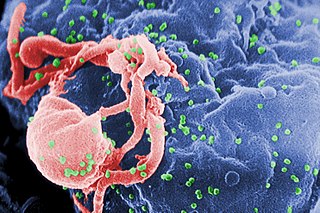Related Research Articles
The management of HIV/AIDS normally includes the use of multiple antiretroviral drugs as a strategy to control HIV infection. There are several classes of antiretroviral agents that act on different stages of the HIV life-cycle. The use of multiple drugs that act on different viral targets is known as highly active antiretroviral therapy (HAART). HAART decreases the patient's total burden of HIV, maintains function of the immune system, and prevents opportunistic infections that often lead to death. HAART also prevents the transmission of HIV between serodiscordant same-sex and opposite-sex partners so long as the HIV-positive partner maintains an undetectable viral load.
HIV-associated nephropathy (HIVAN) refers to kidney disease developing in association with infection by human immunodeficiency virus, the virus that causes AIDS. The most common, or "classical", type of HIV-associated nephropathy is a collapsing focal segmental glomerulosclerosis (FSGS), though other forms of kidney disease may also occur. Regardless of the underlying histology, kidney disease in HIV-positive patients is associated with an increased risk of death.
CD4 immunoadhesin is a recombinant fusion protein consisting of a combination of CD4 and the fragment crystallizable region, similarly known as immunoglobulin. It belongs to the antibody (Ig) gene family. CD4 is a surface receptor for human immunodeficiency virus (HIV). The CD4 immunoadhesin molecular fusion allow the protein to possess key functions from each independent subunit. The CD4 specific properties include the gp120-binding and HIV-blocking capabilities. Properties specific to immunoglobulin are the long plasma half-life and Fc receptor binding. The properties of the protein means that it has potential to be used in AIDS therapy as of 2017. Specifically, CD4 immunoadhesin plays a role in antibody-dependent cell-mediated cytotoxicity (ADCC) towards HIV-infected cells. While natural anti-gp120 antibodies exhibit a response towards uninfected CD4-expressing cells that have a soluble gp120 bound to the CD4 on the cell surface, CD4 immunoadhesin, however, will not exhibit a response. One of the most relevant of these possibilities is its ability to cross the placenta.

Nafamostatmesylate (INN), a synthetic serine protease inhibitor, is a short-acting anticoagulant, and it is also used for the treatment of pancreatitis. It also has some potential antiviral and anti-cancer properties. Nafamostat is a fast-acting proteolytic inhibitor and used during hemodialysis to prevent the proteolysis of fibrinogen into fibrin. The mechanism of action of nafamostat is as a slow tight-binding substrate, trapping the target protein in the acyl-enzyme intermediate form, resulting in apparent observed inhibition.

Sir Alimuddin Zumla is a British-Zambian professor of infectious diseases and international health at University College London Medical School, and a Consultant Infectious Diseases physician at UCLHospitals NHS Foundation Trust, London, UK. He specialises in infectious and tropical diseases, clinical immunology, and internal medicine, with a special interest in HIV/AIDS, respiratory infections, pathogens with epidemic potential and diseases of poverty. He is known for his leadership of infectious/tropical diseases research and capacity development activities. He was awarded a Knighthood in the 2017 Queens Birthday Honours list for services to public health and protection from infectious disease. In 2012, he was awarded Zambia's highest civilian honour, the Order of the Grand Commander of Distinguished services - First Division. In 2024, for the seventh consecutive year, Zumla was recognised by Clarivate Analytics, Web of Science as one of the world's top 1% most cited researchers. In 2021 Sir Zumla was elected as Fellow of The World Academy of Sciences. In 2024, he was elected Member of the prestigious Academy of Europe.

Baricitinib, sold under the brand name Olumiant among others, is an immunomodulatory medication used for the treatment of rheumatoid arthritis, alopecia areata, and COVID-19. It acts as an inhibitor of janus kinase (JAK), blocking the subtypes JAK1 and JAK2.

HIV/AIDS research includes all medical research that attempts to prevent, treat, or cure HIV/AIDS, as well as fundamental research about the nature of HIV as an infectious agent and AIDS as the disease caused by HIV.

Galidesivir is an antiviral drug, an adenosine analog. It was developed by BioCryst Pharmaceuticals with funding from NIAID, originally intended as a treatment for hepatitis C, but subsequently developed as a potential treatment for deadly filovirus infections such as Ebola virus disease and Marburg virus disease, as well as Zika virus. Currently, galidesivir is under phase 1 human trial in Brazil for coronavirus.

Remdesivir, sold under the brand name Veklury, is a broad-spectrum antiviral medication developed by the biopharmaceutical company Gilead Sciences. It is administered via injection into a vein. During the COVID‑19 pandemic, remdesivir was approved or authorized for emergency use to treat COVID‑19 in numerous countries.

Drug repositioning is the repurposing of an approved drug for the treatment of a different disease or medical condition than that for which it was originally developed. This is one line of scientific research which is being pursued to develop safe and effective COVID-19 treatments. Other research directions include the development of a COVID-19 vaccine and convalescent plasma transfusion.

COVID-19 drug development is the research process to develop preventative therapeutic prescription drugs that would alleviate the severity of coronavirus disease 2019 (COVID-19). From early 2020 through 2021, several hundred drug companies, biotechnology firms, university research groups, and health organizations were developing therapeutic candidates for COVID-19 disease in various stages of preclinical or clinical research, with 419 potential COVID-19 drugs in clinical trials, as of April 2021.
Convalescent plasma is the blood plasma collected from a survivor of an infectious disease. This plasma contains antibodies specific to a pathogen and can be used therapeutically by providing passive immunity when transfusing it to a newly infected patient with the same condition. Convalescent plasma can be transfused as it has been collected or become the source material for hyperimmune serum or anti-pathogen monoclonal antibodies; the latter consists exclusively of IgG, while convalescent plasma also includes IgA and IgM. Collection is typically achieved by apheresis, but in low-to-middle income countries, the treatment can be administered as convalescent whole blood.

The Solidarity trial for treatments is a multinational Phase III-IV clinical trial organized by the World Health Organization (WHO) and partners to compare four untested treatments for hospitalized people with severe COVID-19 illness. The trial was announced 18 March 2020, and as of 6 August 2021, 12,000 patients in 30 countries had been recruited to participate in the trial.

Annie F. Luetkemeyer is an American physician and researcher who is Professor of Medicine and Infectious Diseases at the University of California, San Francisco. She specializes in infectious diseases, in particular tuberculosis, human immunodeficiency virus and viral hepatitis. During the COVID-19 pandemic Luetkemeyer led a clinical trial of remdesivir. She has also researched treatment of COVID-19 as a co-infection with HIV.

GS-441524 is a nucleoside analogue antiviral drug which was developed by Gilead Sciences. It is the main plasma metabolite of the antiviral prodrug remdesivir, and has a half-life of around 24 hours in human patients. Remdesivir and GS-441524 were both found to be effective in vitro against feline coronavirus strains responsible for feline infectious peritonitis (FIP), a lethal systemic disease affecting domestic cats. Remdesivir was never tested in cats, but GS-441524 has been found to be effective treatment for FIP.

Jeanne Marisa Marrazzo is an American physician-scientist and infectious diseases specialist. She was the director of the University of Alabama School of Medicine Division of Infectious Diseases and focused on prevention of HIV infection using biomedical interventions. Marrazzo is a fellow of the American College of Physicians and Infectious Disease Society of America. On August 2, 2023 Lawrence A. Tabak, acting director for the National Institutes of Health (NIH), named Jeanne M. Marrazzo as director of NIH’s National Institute of Allergy and Infectious Diseases.
The treatment and management of COVID-19 combines both supportive care, which includes treatment to relieve symptoms, fluid therapy, oxygen support as needed, and a growing list of approved medications. Highly effective vaccines have reduced mortality related to SARS-CoV-2; however, for those awaiting vaccination, as well as for the estimated millions of immunocompromised persons who are unlikely to respond robustly to vaccination, treatment remains important. Some people may experience persistent symptoms or disability after recovery from the infection, known as long COVID, but there is still limited information on the best management and rehabilitation for this condition.

Chloroquine and hydroxychloroquine are anti-malarial medications also used against some auto-immune diseases. Chloroquine, along with hydroxychloroquine, was an early experimental treatment for COVID-19. Neither drug has been useful to prevent or treat SARS-CoV-2 infection. Administration of chloroquine or hydroxychloroquine to COVID-19 patients, either as monotherapies or in conjunction with azithromycin, has been associated with deleterious outcomes, such as QT prolongation. As of 2024, scientific evidence does not substantiate the efficacy of hydroxychloroquine, with or without the addition of azithromycin, in the therapeutic management of COVID-19.
Onyema Eberechukwu Ogbuagu is an American-born infectious diseases physician, educator, researcher, and clinical trial investigator, who was raised and educated in Nigeria. He is an associate professor at Yale School of Medicine in New Haven, CT and is the director of the Yale AIDS Program clinical trials unit. His research contributions have focused on HIV/AIDS prevention and COVID-19 vaccination and treatment clinical trials. He switched his focus at the beginning of the 2019 COVID pandemic and participated as a principal investigator (PI) on the Pfizer-BioNtech COVID-19 vaccine trials and the Remdesivir SIMPLE trial in 2020 and 2021. In pursuit of his global health component of his career, Ogbuagu also supports postgraduate physician medical education programs in low and middle income countries in sub-Saharan Africa in Rwanda (2013–2018) and Liberia as well as HIV treatment programs in Liberia.

David Boulware is a professor of medicine and a practicing infectious disease physician at the University of Minnesota Medical School. He is a member of the graduate faculty for the University of Minnesota School of Public Health Epidemiology PhD program and for the Microbiology, Immunology, and Cancer Biology (MICaB) graduate program. Boulware was the first Lois & Richard King Distinguished Assistant Professorship at the University of Minnesota. Boulware is an active medical researcher engaged in clinical trials in infectious diseases. His expertise is particularly in the realm of HIV-related meningitis, including Cryptococcosis and Tuberculous meningitis.
References
- ↑ UCL (2020-04-02). "UCL researchers lead trial to test remdesivir drug on COVID-19 patients". UCL News. Retrieved 2024-06-17.
- ↑ "Sarah Pett". MRC Clinical Trials Unit at UCL. Retrieved 2020-05-15.
- ↑ "Dr Sarah Pett". UNSW Sites. Retrieved 2024-06-17.
- ↑ "Sarah Pett". MRC Clinical Trials Unit at UCL. Retrieved 2024-06-17.
- 1 2 "ACTT-EU/UK trial finds remdesivir speeds up COVID-19 recovery". MRC Clinical Trials Unit at UCL. Retrieved 2020-05-15.
- ↑ "COVID-19 Tied to Wide Range of Neuropsychiatric Complications". Medscape. Retrieved 2024-06-17.